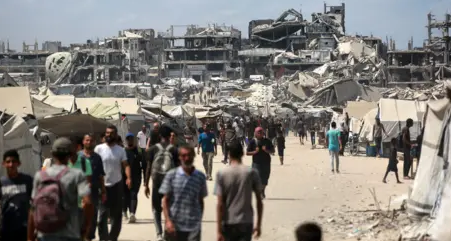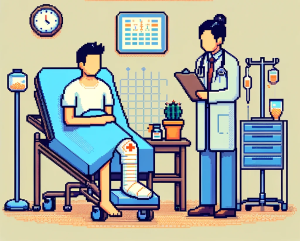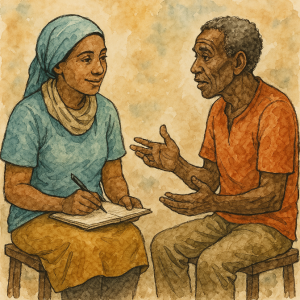
Healthcare Crisis in Gaza: The Impact of Depleting Resources Amidst Conflict
The ongoing healthcare crisis in Gaza has reached alarming levels, with reports from the World Health Organization (WHO) highlighting a ‘catastrophic’ situation. Hospitals are overwhelmed and life-saving medicines have run out, raising serious concerns about the capacity of the health system to cope with the increasing demand (UN News.)
The Dire State of Gaza’s Health Infrastructure
The health system in Gaza, already severely crippled by longstanding blockades and recurrent conflicts, has been pushed to its breaking point. Medical facilities operate beyond their limits, resources are strained, and basic medical supplies are persistently scarce. This has greatly hampered the ability to effectively respond to emergencies and provide routine medical care.
The humanitarian impact of the ongoing conflict is far-reaching. The blockade has drastically restricted the entry of essential medicines and equipment, further exacerbating the dire condition of Gaza’s health facilities. The situation is worsened by frequent power outages, affecting hospital operations and the preservation of medical supplies.
The Humanitarian Costs of Medical Shortages
The repercussions of these shortages are felt most acutely by vulnerable populations, including children and the chronically ill. Recent reports indicate a surge in preventable diseases and deaths, particularly among infants and young children, due to the lack of essential healthcare services (UN News.)
Malnutrition remains a critical issue, with at least 100 children reportedly dying from malnutrition-related complications. These figures underscore the urgent need for international intervention and support to ensure the health and survival of Gaza’s youngest (UN News).
Calls for Immediate International Support
Amidst these challenges, there is a clarion call from humanitarian agencies for immediate international support. The need to expedite medical evacuations and allow the inflow of food and medical supplies is critical to alleviating the current health crisis. Global organizations and neighboring countries are urged to pressure for the easing of blockades to facilitate the access of vital resources to the occupied regions.
WHO and other international bodies have stressed the importance of a coordinated global response to alleviate the worsening humanitarian conditions.
Funding and Logistic Support Necessity
The call for action is not only about the immediate influx of resources but also about long-term strategies to prevent future crises. This includes funding for medical education, training healthcare providers, rebuilding of healthcare infrastructures, and implementing sustainable healthcare solutions (UN News.)
A Humanitarian Imperative
The situation in Gaza is an urgent need for international solidarity and intervention. Ensuring uninterrupted healthcare services in conflict zones is not only a moral obligation but also imperative for fostering stability and peace in the region. Amid global crises, it is crucial to remember that healthcare is a human right that must transcend political and territorial divides. In responding to the healthcare crisis in Gaza, the international community has a unique opportunity to reaffirm its commitment to this principle by taking decisive, coordinated action.



